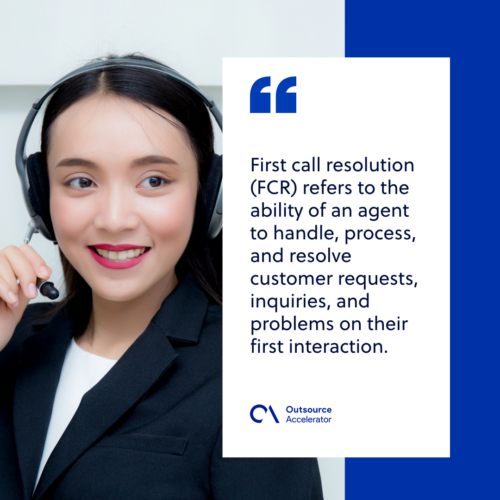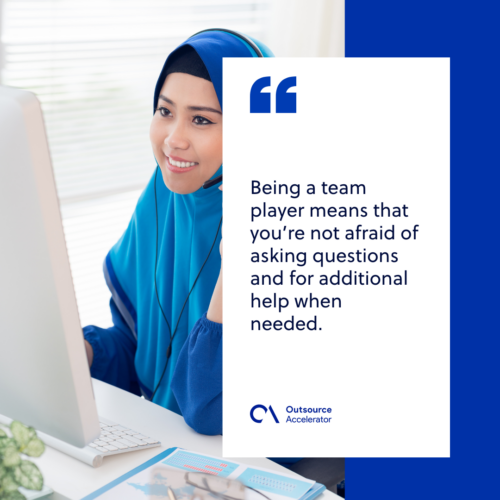Everything you need to know about first call resolution

It can be quite frustrating for customers when their concerns or issues have not been resolved during their first call.
At the same time, it also has an impact on the performance and efficiency of the customer service team members, including the organization. After all, poor customer service is not a good look for any company.
One of the top priorities and objectives of a call center support team is to be able to provide quality customer service to their patrons.
As a call center representative, you need to be able to solve customer problems during the first call.
This article explains the importance of first call resolution, its best practices, and some tips on how you can enhance your team’s performance and improve customer satisfaction.
What does first call resolution mean?
First call resolution (FCR) is also known as first contact resolution. This refers to the ability of an agent to handle, process, and resolve customer requests, inquiries, and problems on their first interaction.
Traditionally, first call resolution is typically done via phone calls. With the advent of continuous tech modernization, first call resolution can now also be covered via email, chat, and other communication channels.
First call resolution serves as an important call center metric for team leaders to measure and assess their agents’ performance, knowledge, and skills.

How do you measure first call resolution?
You can calculate your agent’s first call resolution rate by simply dividing their total number of resolved calls by the overall number of customer calls each day. The exact contact resolution rate formula is as follows:
First call resolution = Total number of resolved calls / Total number of customer calls
What is a good first contact resolution rate?
According to SQM Group, a good rate for the first call resolution is 70% to 75%. It’s the industry standard when it comes to taking in and resolving calls.
An after-call survey is just as important as solving the issue. The data will be stored and used for future reference.
The data that is being collected using an after-call customer satisfaction survey will be able to tell specific areas of improvement.
Why is first call resolution important?
First call resolution rate is important as it measures the skills and effectiveness of the customer service team. Furthermore, it is a reflection of the management’s ability to train the workforce.
Monitoring first contact resolution helps in determining customer satisfaction. The sooner a customer’s issue is solved, the higher their satisfaction levels, leading to increased customer retention.
Not only does a good first-contact resolution rate increase customer satisfaction, but it also showcases the efficiency of the support team and makes customer relationship management a lot easier.
First call resolution best practices
Just like in any other standard operating procedure, first call resolution rate also has its best practices, and this includes the following:
Practice active listening
Active listening is one of the key skills that a support team must learn, as it is an essential part of customer interactions.
Even if the other person is being difficult, keep in mind that they have been experiencing these issues way before they reached out.
Practice active listening to pick up some points that will help resolve the issue. Doing so makes a difference and boosts customer satisfaction.
Minimize the waiting time
The shorter the waiting time, the higher the customer satisfaction. After all, no one likes to listen to a nameless tune over the phone—especially if the matter is pressing enough.
Minimize the waiting time between customers by delegating the right amount of tasks to active call center agents.
As a team leader, it’s your responsibility to ensure that no one in the support department has an excessive workload while others barely have anything to do.
Have an easily accessible knowledge base
Having an easy-to-access knowledge base helps improve customer experience as they do not have to contact customer support.
One example of this is your site’s Frequently Asked Questions (FAQs) page. Another example is company modules, which include important information regarding the company’s products and services.
Another convenient tool is a customer service portal, which gives customers easy access to the contact center.
When customers have the answers to their own inquiries, it reduces the amount of repeat calls, lightens the load of support agents, and improves the overall customer experience.
Get as much information as you can
Contact support agents are trained to ask probing questions to help their customers during an interaction.
Make sure that your agents have an in-depth understanding of the company and what you offer to your customers.
Customers always prefer to have a call center representative who has all the answers or knows someone who does. Learning as much as you can or getting help from others reduces repeat calls and waiting times.
Don’t be afraid to ask for help
In order to improve first contact resolution rate, it is best to redirect difficult customer inquiries to someone more knowledgeable.
Being a team player means that you’re not afraid to ask questions and for additional help when needed.
Most calls and inquiries, even if it doesn’t count towards your first call resolution rate, are solved when multiple people and opinions are involved, making for great customer service.

3 basic tips to improve first call resolution
To improve first call resolution rate, the first thing you should do is to identify your agents’ weaknesses, anything that may lead to poor customer service.
Continuously train and mentor your agents regarding first call resolutions’ best practices. More so, brush up on their product and service knowledge.
As a team, be proactive about learning the new updates about the account you’re handling. Remember to keep the following strategies in mind:
- Stay on topic. When the conversation is drifting away from the issue or the inquiry, don’t be afraid to steer it on track again.
- Ask relevant questions. Asking follow-up questions will help your agents pinpoint the nature of the issue that the customer is calling about.
- Internalize one-on-one coaching sessions. Use the coaching session as a safe space for you to point out what else you think your agents need to improve on.
Again, first call resolution rate is an ability that can be taught and developed. It’s also heavily reliant on how the call flows and the nature of the issue.







 Independent
Independent




